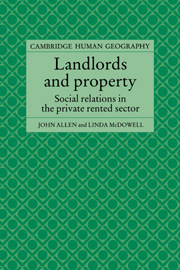Book contents
- Frontmatter
- Contents
- List of figures and tables
- Preface
- 1 Introduction
- 2 Private landlords: the anatomy of uneven decline
- 3 The structure of private landlordism
- 4 Research design and methods
- 5 Landlords in profile: an intensive survey
- 6 Landlords in the inner city: an extensive survey
- 7 Political ideologies and private rental policies
- Policy postscript
- Appendix 1 Selecting the landlord sample from housing waiting list records
- Appendix 2 Who was rehoused?
- References
- Index
5 - Landlords in profile: an intensive survey
Published online by Cambridge University Press: 17 September 2009
- Frontmatter
- Contents
- List of figures and tables
- Preface
- 1 Introduction
- 2 Private landlords: the anatomy of uneven decline
- 3 The structure of private landlordism
- 4 Research design and methods
- 5 Landlords in profile: an intensive survey
- 6 Landlords in the inner city: an extensive survey
- 7 Political ideologies and private rental policies
- Policy postscript
- Appendix 1 Selecting the landlord sample from housing waiting list records
- Appendix 2 Who was rehoused?
- References
- Index
Summary
This chapter is based on the results of in-depth interviews with different types of landlords owning and renting residential property in Hackney and Islington. In Chapter 3 we argued that attempts to classify landlords have often been marred by inadequate conceptualisation; that analyses have tended to accept rather uncritically the convention of classifying landlords by the number of properties they own and their legal status. We then proposed an alternative classification of landlords based upon the differences in their historical, ideological and economic characteristics, and identified six causally structured groups. Here we focus upon each of these groups in turn, to show how the actual characteristics of individual members within a group combine to admit the possibility of emergent causal powers.
If we take seriously the idea that landlords may be considered as a series of structured groups then we should be able to subject such a notion to empirical scrutiny. Indeed this is the rationale for intensive research; it offers the possibility of investigating the structural relations that bind particular groups and identifies certain social practices that would very likely be glossed over in more formal, extensive modes of research. There are, of course, attendant risks connected with this approach.
- Type
- Chapter
- Information
- Landlords and PropertySocial Relations in the Private Rented Sector, pp. 74 - 109Publisher: Cambridge University PressPrint publication year: 1989



